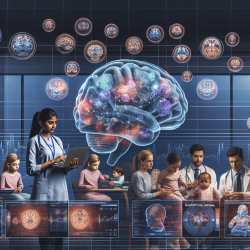Central nervous system (CNS) neoplasms are the most common solid tumors diagnosed in children, representing a significant cause of cancer-related morbidity and mortality. Despite improvements in survival rates, the long-term effects on neurological, cognitive, and neuropsychological functions remain a substantial challenge.
Key Findings and Their Implications
The review identifies several critical areas where practitioners can focus their efforts to improve patient outcomes:
- Early Intervention and Monitoring: Early identification and intervention are crucial. Practitioners should implement regular neuropsychological assessments to monitor cognitive functions over time. This proactive approach allows for timely interventions that can significantly improve the child's quality of life.
- Understanding Risk Factors: Awareness of individual patient characteristics, such as age at diagnosis and treatment, tumor location, and treatment modalities, can help predict which children are at higher risk for cognitive impairments. This knowledge enables tailored interventions to address specific needs.
- Multidisciplinary Approach: Collaboration among healthcare providers, including neuropsychologists, oncologists, and educators, is essential. A comprehensive care plan that addresses medical, cognitive, and psychosocial aspects can better support the child's development and overall well-being.
- Utilizing Advanced Therapies: Advanced radiotherapy techniques, such as proton therapy, show promise in reducing cognitive side effects compared to traditional methods. Practitioners should stay informed about these advancements and advocate for their use when appropriate.
Encouraging Further Research
While the review provides valuable insights, there are still many unanswered questions. Practitioners are encouraged to engage in or support ongoing research efforts to better understand the mechanisms underlying cognitive impairments and develop more effective interventions. Areas for further investigation include:
- The long-term impact of different treatment modalities on cognitive development.
- The role of genetic predispositions in treatment-related neurotoxicity.
- The effectiveness of various cognitive rehabilitation strategies.
Conclusion
By integrating the findings from this review into clinical practice, practitioners can enhance their skills and improve outcomes for children treated for brain tumors. The commitment to continuous learning and collaboration is vital in addressing the complex needs of these patients.
To read the original research paper, please follow this link: Neuropsychological Outcomes of Children Treated for Brain Tumors.










